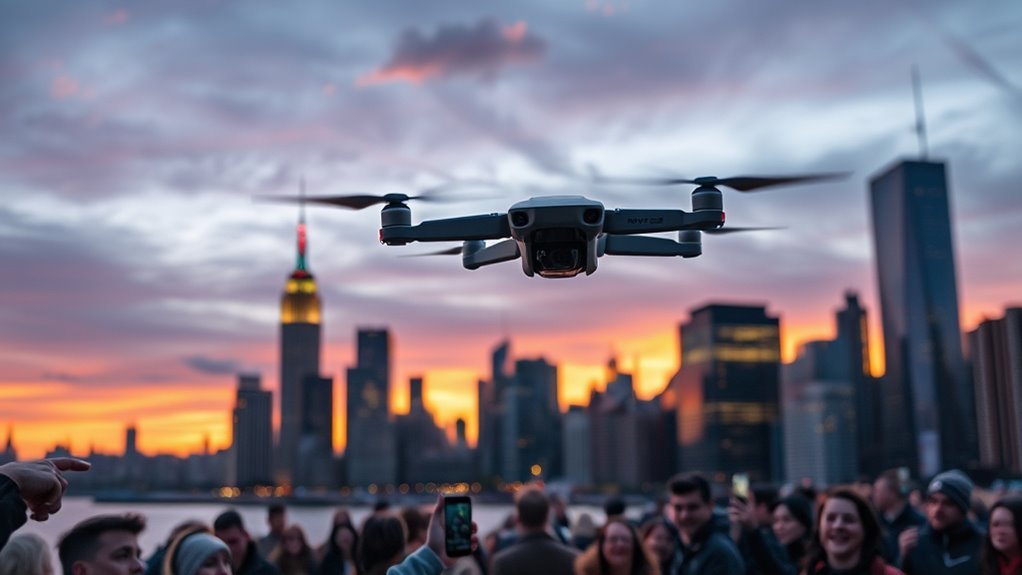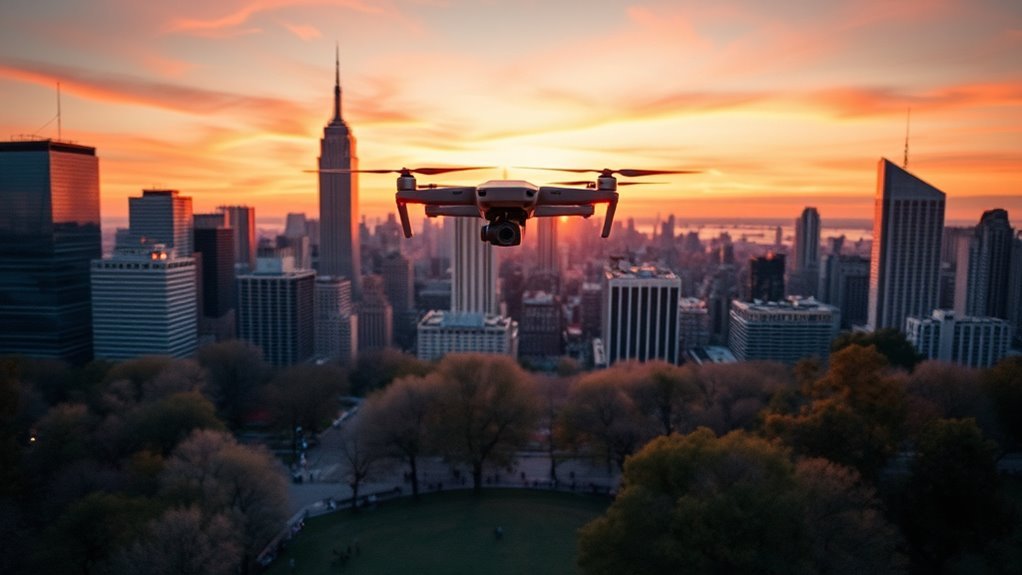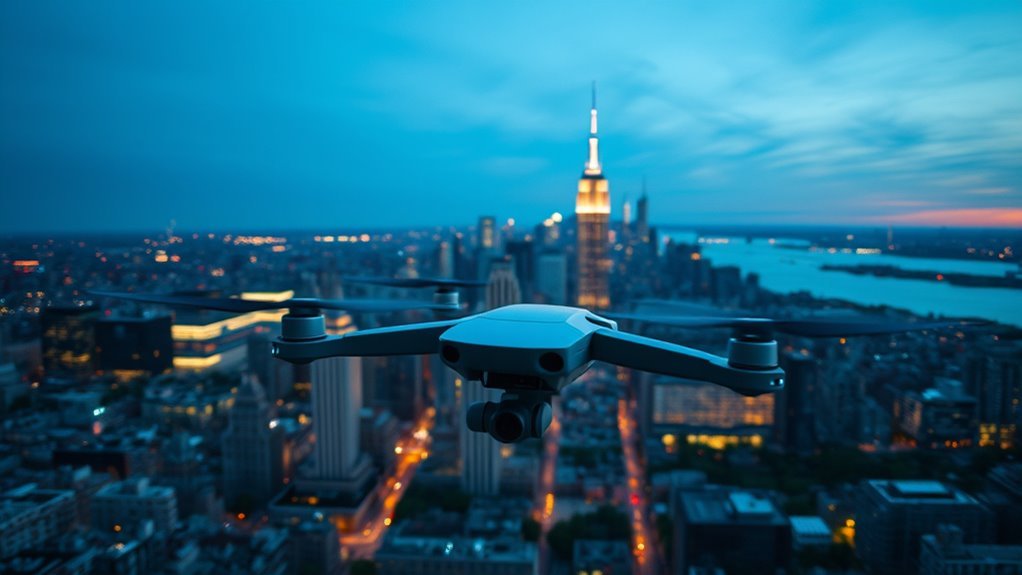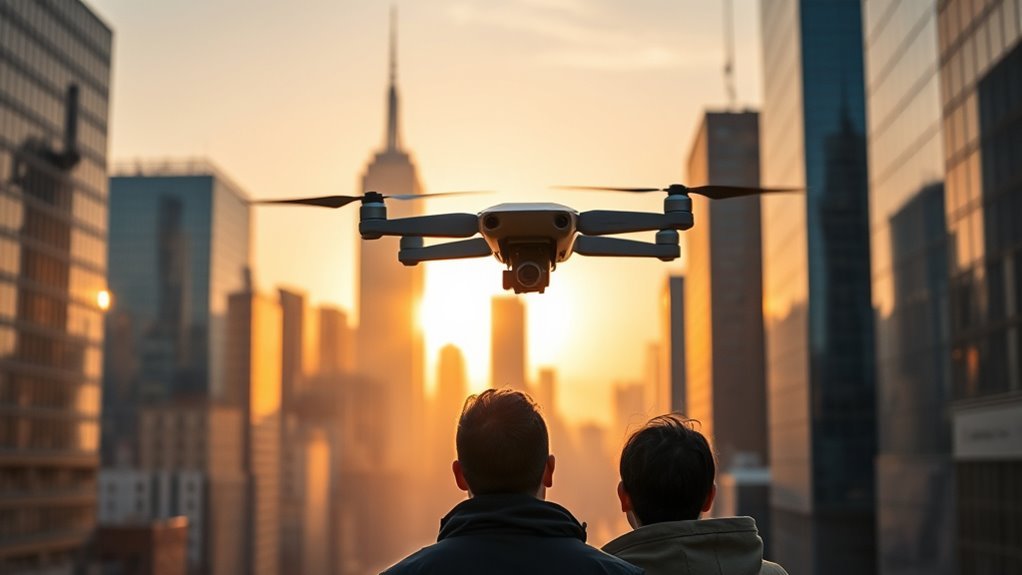Drones aren’t illegal in New York, but you must follow strict federal, state, and local regulations. Flight permissions may be needed in certain areas, and you can’t fly over people or property without consent. Registration is required for drones over 0.55 pounds, and commercial pilots need a license. Familiarity with airspace classifications is essential for safe navigation. Staying informed about local ordinances is vital for responsible flying. There’s much more you should know to avoid penalties and operate safely.
Overview of Drone Regulations in New York

As drone usage continues to rise in New York, understanding the regulatory landscape is essential for both hobbyists and commercial operators. Maneuvering through these regulations guarantees you’re not just compliant but also promoting drone safety. In New York, you must obtain flight permissions from relevant authorities for specific areas, especially near airports or densely populated zones. The New York State law emphasizes the importance of not endangering people or property, meaning you need to remain aware of local ordinances as well. Furthermore, operators are encouraged to follow FAA guidelines to enhance safety practices. By familiarizing yourself with these regulations, you can enjoy the freedom of flying your drone while assuring responsible operation in shared airspace. Additionally, knowing the distance limitations imposed by regulations will help you plan your flights effectively.
Federal Drone Laws and Their Impact

Understanding federal drone laws is essential for maneuvering the complexities of drone operation in New York. The FAA’s regulations define airspace classifications and establish enforcement mechanisms that can greatly affect your flying experience. Awareness of these laws can help you avoid penalties and guarantee compliance with both federal and state regulations. Additionally, staying informed about local regulations governing drone flights is crucial for responsible operation in residential areas.
FAA Regulations Overview
While traversing the complex landscape of drone regulations, it is vital to grasp how Federal Aviation Administration (FAA) laws shape both commercial and recreational drone use in New York. The FAA sets the groundwork for drone technology, requiring operators to register their drones and adhere to specific safety protocols. For those interested in aerial photography, understanding these regulations is significant; they dictate where and how you can fly. You’ll need to stay below 400 feet, avoid restricted airspace, and respect privacy laws. These rules are designed to promote safety while allowing you to explore the potential of your drone. Familiarizing yourself with FAA guidelines empowers you to navigate your drone activities confidently, ensuring both compliance and creativity in your pursuits.
Airspace Classifications Explained
Maneuvering airspace classifications is a key aspect of compliant drone operation in New York. Understanding airspace types is essential for ensuring safe navigation and avoiding potential legal issues. The FAA categorizes airspace into several classes, including Class A, B, C, D, and E, each with distinct navigation rules. For instance, Class B airspace surrounds major airports and requires specific permissions, while Class G airspace is unrestricted for drone use. By familiarizing yourself with these classifications, you can confidently fly your drone while adhering to federal regulations. Remember, the freedom to operate your drone comes with the responsibility to respect the airspace structure and its associated rules, promoting safety and compliance for everyone in the skies.
Enforcement and Penalties
As drone usage continues to grow, so do the enforcement measures and penalties associated with federal drone laws. You’ll find that enforcement challenges arise due to the rapidly evolving technology and diverse applications of drones. Agencies struggle to monitor compliance effectively, leading to inconsistencies in how laws are applied. Penalty structures can vary markedly, ranging from fines to criminal charges, depending on the severity of the violation. For instance, flying in restricted airspace can result in hefty fines or even loss of your drone. Understanding these enforcement measures is essential if you want to navigate the skies freely while staying within the bounds of the law. Keeping informed helps you avoid penalties and guarantees a more responsible drone flying experience.
State-Specific Drone Rules

In New York, state-specific drone rules can considerably influence how you operate your drone. These regulations often vary from local ordinances, which may impose additional restrictions based on community needs and safety concerns. Understanding both state and local laws is essential for compliant and responsible drone use.
State Regulations Overview
While maneuvering the skies above New York, drone operators must be acutely aware of the state’s specific regulations that govern their activities. Understanding these laws is essential for anyone using drone technology, especially for purposes like aerial photography. Here’s a brief overview of key regulations to keep in mind:
- Drones must be registered with the FAA.
- Operators need to maintain a visual line of sight.
- Flights are prohibited over people not involved in the operation.
- No flying in controlled airspace without permission.
- Local laws may impose additional restrictions.
Local Ordinances Impact
Numerous local ordinances can greatly impact how you operate your drone in New York. Each municipality can enact its own local laws, which may impose additional drone restrictions beyond state and federal regulations. For instance, some cities might designate specific no-fly zones, particularly near schools, parks, or government buildings, while others might require permits for commercial use. It’s vital to research the specific ordinances in your area to avoid violations that could lead to fines or other penalties. Ignoring these local laws could undermine your freedom to fly. Always check with local authorities or consult online resources to verify you’re compliant and can enjoy the full benefits of drone flying without unnecessary legal complications.
Restricted Areas for Drone Flight
Although drone technology has rapidly advanced, understanding the restricted areas for drone flight in New York is essential for both safety and compliance. There are several no fly zones and sensitive locations where you can’t operate your drone without facing serious consequences. Familiarizing yourself with these areas helps you enjoy flying while respecting laws.
Understanding New York’s drone no-fly zones is crucial for safety and legal compliance while enjoying your flight.
- Airports and heliports
- National parks and wildlife refuges
- Government buildings and military installations
- Crowded public events and gatherings
- Areas near emergency response operations
Registration and Licensing Requirements
Before you take to the skies with your drone in New York, it’s vital to understand the registration and licensing requirements that govern its use. To fly legally, you need to guarantee your drone is registered with the FAA if it weighs over 0.55 pounds. Additionally, if you plan to operate commercially, obtaining a pilot license under Part 107 is essential.
Here’s a quick overview:
| Requirement | Details |
|---|---|
| Drone Registration | Required for drones over 0.55 lbs |
| Pilot Licensing | Required for commercial use |
| Registration Fee | $5 for three-year period |
| Age Requirement | Must be at least 13 years old |
Fulfilling these requirements will help you enjoy your drone flying while staying within legal boundaries.
Safety Guidelines for Drone Operators
When operating a drone in New York, adhering to safety guidelines is essential not only for your protection but also for the safety of others. To guarantee a smooth flying experience, keep these key points in mind:
- Perform regular drone maintenance to avoid malfunctions.
- Utilize safety equipment, such as propeller guards and first aid kits.
- Maintain a safe distance from people and property to prevent accidents.
- Stay informed about local regulations and no-fly zones.
- Avoid flying in adverse weather conditions that could compromise safety.
Consequences of Violating Drone Laws
Failing to adhere to drone laws in New York can lead to serious repercussions for operators. When you operate outside the legal framework, you expose yourself to significant liability issues. These may include fines, civil suits, and even criminal charges, depending on the severity of the violation. Legal repercussions can escalate quickly, especially if your drone causes property damage or personal injury. It’s vital to understand that ignorance of the law isn’t a defense; being uninformed won’t protect you from consequences. Furthermore, repeated violations can result in the suspension or revocation of your flying privileges, limiting your freedom to operate in the future. Staying informed and compliant is essential for enjoying the benefits of drone technology without facing harsh penalties.
Resources for Drone Pilots in New York
Maneuvering the landscape of drone operation in New York requires access to reliable resources that can help you stay informed and compliant. Engaging with the right pilot resources and drone communities can greatly enhance your flying experience and knowledge. Here are some essential resources you should consider:
- FAA Drone Zone: Official site for regulations and notifications.
- NYC Department of Transportation: Local flying laws and restrictions.
- Drone Pilot Network: Connect with fellow pilots for advice and support.
- Online Forums: Share experiences and learn from others in the community.
- Drone Training Programs: Improve your skills and understanding of regulations. Additionally, familiarize yourself with drone registration requirements to ensure you comply with legal standards before flying.
Frequently Asked Questions
Can I Fly a Drone for Commercial Purposes in New York?
You can fly a drone for commercial purposes in New York, but you’ll need to comply with commercial drone regulations and obtain a drone pilot certification. Understanding these requirements guarantees a safe and lawful flying experience.
What Insurance Do I Need for Operating a Drone in New York?
Before you take flight, consider this: you’ll need drone liability insurance to protect yourself from potential mishaps. Familiarize yourself with the insurance requirements in New York, ensuring you’re covered when operating your drone.
Are There Any Age Restrictions for Flying Drones in New York?
In New York, drone regulations specify that operators must be at least 13 years old. However, if you’re under 16, you’ll need parental consent to meet the age requirements for flying drones legally.
Can I Use My Drone for Photography in New York City?
While you might envision capturing stunning skyline shots, legal restrictions in New York City can complicate drone photography. Always check local regulations to verify you’re flying legally and safely, protecting both your creativity and compliance.
What Should I Do if I Encounter a Drone Emergency?
If you encounter a drone emergency, prioritize safety. Follow established emergency procedures: assess the situation, maintain distance, and report to authorities. Understanding drone safety protocols guarantees you’re prepared for unexpected events and minimizes risks effectively.

